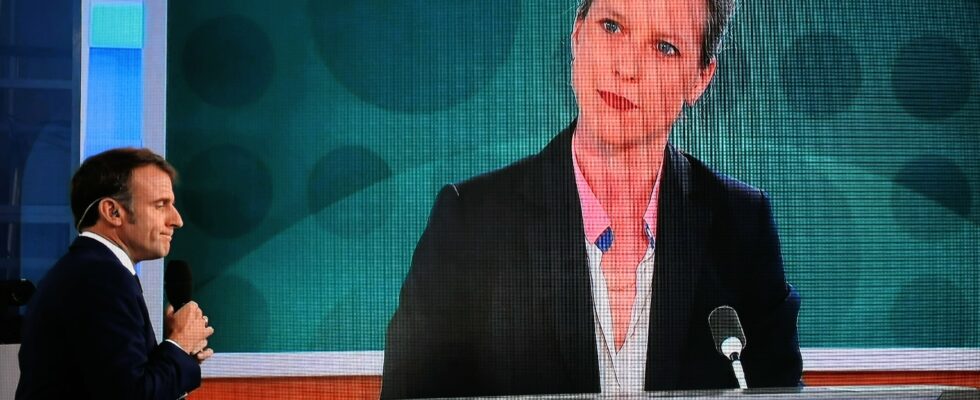This is the umpteenth battle in a war of nerves. By submitting the name of Lucie Castets to Emmanuel Macron at Matignon on Tuesday, July 23, the left put pressure on the head of state, accused of not recognizing the result of the last legislative elections. The president, for his part, immediately dismissed the proposal, arguing that there was no majority on the left to govern. Here are the two camps engaged in an endless tango: that of interpreting the verdict of the ballot boxes. If I don’t know who won, how do I know who should govern?
No one saw it coming. The left, mired in its divisions, only provoked sniggers or despair. She finally let slip a name. The white smoke emerged this Tuesday at 7 p.m., in the form of a press release from the New Popular Front (NFP). The alliance of the left, which came out on top in the legislative elections, then “presented” to Emmanuel Macron its “proposal”: to appoint Lucie Castets as Prime Minister. Unknown to the general public, this senior civil servant, closer to the Socialist Party than to LFI, is committed to defending public services. As soon as the name was revealed, the injunctions rained down. “The President of the Republic must no longer procrastinate,” thunders Jean-Luc Mélenchon. “Macron must recognize the result of the elections and appoint her,” agrees the head of the Ecologists Marine Tondelier. Lucie Castests herself is projecting herself into her future functions, and promises to put all her “energy” and “conviction” into them.
“You know her ?”
Weeks of invective, for a quick resolution? Far from being a coincidence. Emmanuel Macron is due to speak an hour later on France 2, to comment on the verdict of the ballot boxes and the imminent start of the Paris Olympic Games. He intends to defend once again the formation of a coalition of republican forces in this ungovernable National Assembly, without a clear majority.
The announcement of the left? The Elysée prefers to laugh about it, hardly fooled by the maneuver. “We are pleased that this interview was useful for them,” smiles one of the Head of State’s interlocutors. The central bloc is more divided. “Do you know her?”, “A graduate of the ENA, really a desire for modernity!”… We are certainly ironic about this mysterious profile in the eyes of the French, pulled out of the hat at the last minute. But several elected officials recognize at the same time the nice strategic move of the New Popular Front, finally capable of embodying its governmental ambitions. “It is doubly clever in terms of timing and substance, notes a deputy from Ensemble pour la République (EPR). Ms. Castests is unknown and therefore unassailable.” The only thing left is the timing, which is late. “July 23rd puts less pressure on than a month ago, notes a Horizons executive. People are on vacation, the Olympic period is starting.”
“The subject is not a name”
Emmanuel Macron stands firm. The head of state dismisses the Castests hypothesis on France 2. “The subject is not a name given by a political party. The question is what majority can emerge in the Assembly so that the government of France can pass reforms.” In his speech, the head of state deconstructs the story of a victory for the left in the legislative elections. It is the first bloc with 193 seats? “The party that came out on top is the RN,” he corrects. It demands Matignon by virtue of its status as the main force? “It is 100 votes short of an absolute majority,” he tempers. He repeats his mantra. Only a coalition of the parties that blocked the National Rally can lead the country. Even if it means playing the ventriloquist of the French by giving a very personal reading – and in line with its interests – of the republican front. “The French have given a responsibility to the forces that reached an agreement between the two rounds. It is to work together.”
France had become accustomed to questioning the political legitimacy of its elected leaders in the face of the extreme right. It is now questioning the result of an election that was sixteen days old. Who won? Who can claim to govern? Here, no consensus. Rather a war of attrition, made up of divergent and interested political interpretations. The left fired first. As soon as the results were known, the rebellious leader Jean-Luc Mélenchon demanded Matignon and instilled the story of a victory for his own people.
Deadlock in the Assembly
The central bloc is taking a hit, its calls for a broad coalition are drowning in indifference. “We need to build another narrative,” notes an EPR MP. The divisions on the left are helping to correct the situation, such as the reappointment of Yaël Braun-Pivet on July 18 as President of the National Assembly against the communist André Chassaigne. “This shows that it is wrong to say that the NFP has a majority in this Assembly,” insisted Emmanuel Macron. The left suffered a defeat that day. No matter: the next day it won a majority in the Bureau of the Assembly – a sort of Parliament of Parliament – and strengthened its ambitions.
The choice of Lucie Castets, combined with Emmanuel Macron’s curt response, illustrates this impasse. However, the ball is in the court of the head of state. The left, despite its divisions, is in working order. The president is still struggling to outline the coalition he is calling for. The responsibility now rests on him. “If no alternative is put in place to face the NFP, we may have to turn to them,” a minister recently warned. The president was calling for an Olympic truce during the Olympics? The holiday homework will be even busier than expected.
.
